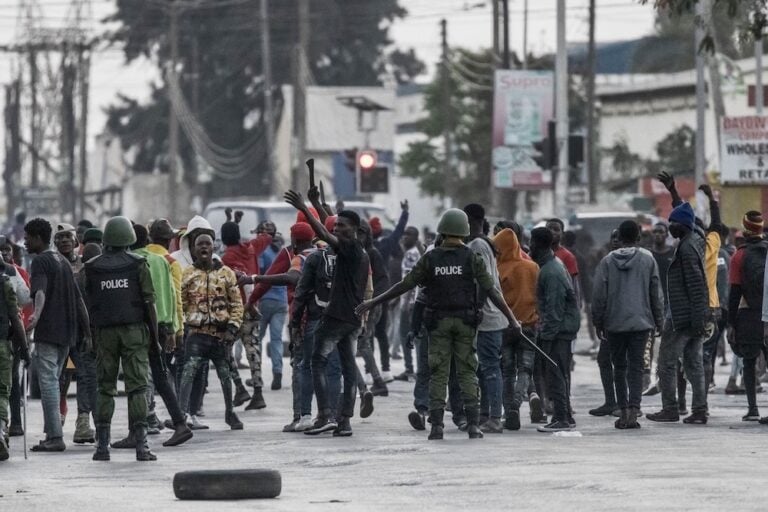(MISA/IFEX) – The six “Post” reporters who received summonses and were charged with espionage on 17 March 1999 were granted bail of K100 000 (US$43) each on the morning of 18 March. Appearing before the Principal Resident Magistrate in Lusaka, the six were not asked to plead. They were told to appear in court again […]
(MISA/IFEX) – The six “Post” reporters who received summonses and were
charged with espionage on 17 March 1999 were granted bail of K100 000
(US$43) each on the morning of 18 March. Appearing before the Principal
Resident Magistrate in Lusaka, the six were not asked to plead. They
were
told to appear in court again on 16 April. The six journalists are:
Brighton
Phiri, Kelvin Shimo, Joe Kaunda, Amos Malupenga, Lubasi Katunda and
Goodson
Machona.
**Updates IFEX alerts of 17 March, 15 March, 12 March, 11 March and 10
March
1999**
In another development, the Zambian Independent Media Association, ZIMA,
which is also the Zambian chapter of MISA, has withdrawn its cooperation
with the government on all matters concerning the media, effective
immediately. In a letter addressed to the Permanent Secretary in the
Ministry of Information and Broadcasting, Susan Sikaneta, ZIMA explained
that it was obliged to embark on this course of action in view of the
current government action against the “Post” newspaper.
ZIMA chairperson David Simpson said: “In respect of calls for ZIMA to
join
[the Press Association of Zambia] PAZA in a single organisation, the
current
polarisation between the state-owned and independent media is, contrary
to
frequently expressed opinions, being perpetuated by the state itself
rather
than by ZIMA.”
ZIMA along with a number of independent media houses had been in
involved
in several consultative forums convened by Sikaneta this year. The aim
of
the forums was to come up with a new information policy for Zambia which
would apply to government and which would determine the manner in which
government interacted with the media. The forums were also aimed at
addressing ways in which the development of media in Zambia could be
enhanced.
Background Information
The six journalists were arrested variously on the night of 9 March and
the
morning of 10 March, apparently after an order for the police to arrest
all
“Post” journalists before dawn. They were released on 12 March following
a
harbeas corpus application by the newspaper. The arrest of the reporters
was
coupled with a siege of the “Post” editorial offices and its separately
located printing press, resulting in a delay of several hours in the
printing of the paper. On 10 March, police surrounded the two buildings
and
prevented anyone from entering or leaving, and also cut the power and
water
supply. On 11 March, the “Post” failed to appear on the streets of
Lusaka as
scheduled, the first time this had happened in its seven-year history.
Those
trapped in the building housing the printing press managed to print the
paper, but the police prevented it from being distributed. The 11 March
edition of the paper was eventually sold openly on the streets of Lusaka
on
the next day.
On 17 March, police issued summonses and formally charged the six with
espionage. They were each served with their papers at the editorial
office
of the “Post”.
The crackdown on the “Post” followed an uproar caused in the National
Assembly stemming from the lead story in the paper on 9 March. The story
questioned the military capacity of Zambia to withstand an incursion
from
neighbouring Angola.
The article in question can be read on the Internet at:
http://www.zamnet.zm/zamnet/post.arch.20742/news/fpstory.html


